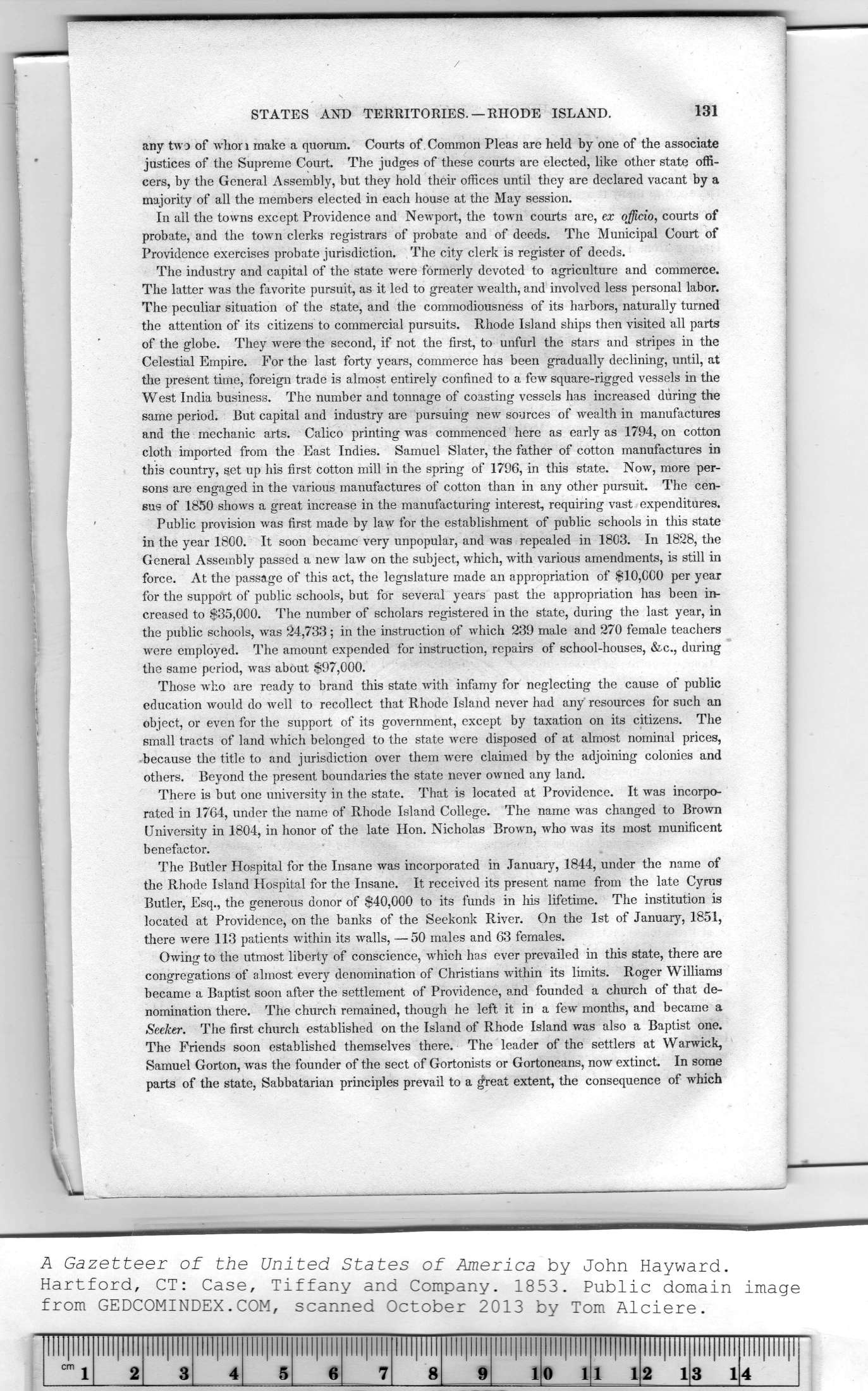|
|
Note: Ctrl and + increases the font size of the text below, Ctrl and - decreases it, and Ctrl and 0 resets it to default size.
STATES AND TERRITORIES.—RHODE ISLAND. 131
any two of whor 1 make a quorum. Courts of Common Pleas are held by one of the associate
justices of the Supreme Court. The judges of these courts are elected, like other state offi-
cers, by the General Assembly, but they hold their offices until they are declared vacant by a
majority of all the members elected in each house at the May session.
In all the towns except Providence and Newport, the town courts are, ex officio, courts of
probate, and the town clerks registrars of probate and of deeds. The Municipal Court of
Providence exercises probate jurisdiction. The city clerk is register of deeds.
The industry and capital of the state were formerly devoted to agriculture and commerce.
The latter was the favorite pursuit, as it led to greater wealth, and involved less personal labor.
The peculiar situation of the state, and the commodiousness of its harbors, naturally turned
the attention of its citizens to commercial pursuits. Rhode Island ships then visited all parts
of the globe. They were the second, if not the first, to unfurl the stars and stripes in the
Celestial Empire. For the last forty years, commerce has been gradually declining, until, at
the present time, foreign trade is almost entirely confined to a few square-rigged vessels in the
West India business. The number and tonnage of coasting vessels has increased during the
same period. But capital and industry are pursuing new sources of wealth in manufactures
and the mechanic arts. Calico printing was commenced here as early as 1794, on cotton
cloth imported from the East Indies. Samuel Slater, the father of cotton manufactures in
this country, set up his first cotton mill in the spring of 1796, in this state. Now, more per-
sons are engaged in the various manufactures of cotton than in any other pursuit. The cen-
sus of 1850 shows a great increase in the manufacturing interest, requiring vast expenditures.
Public provision was first made by law for the establishment of public schools in this state
in the year 1800. It soon became very unpopular, and was repealed in 1803. In 1828, the
General Assembly passed a new law on the subject, which, with various amendments, is still in
force. At the passage of this act, the legislature made an appropriation of $10,000 per year
for the support of public schools, but for several years past the appropriation has been in-
creased to $35,000. The number of scholars registered in the state, during the last year, in
the public schools, was 24,733 ; in the instruction of which 239 male and 270 female teachers
were employed. The amount expended for instruction, repairs of school-houses, &c., during
the same period, was about $97,000.
Those w'ko are ready to brand this state with infamy for neglecting the cause of public
education would do well to recollect that Rhode Island never had any resources for such an
object, or even for the support of its government, except by taxation on its citizens. The
small tracts of land which belonged to the state were disposed of at almost nominal prices,
because the title to and jurisdiction over them were claimed by the adjoining colonies and
others. Beyond the present boundaries the state never owned any land.
There is but one university in the state. That is located at Providence. It was incorpo-
rated in 1764, under the name of Rhode Island College. The name was changed to Brown
University in 1804, in honor of the late Hon. Nicholas Brown, who was its most munificent
benefactor.
The Butler Hospital for the Insane was incorporated in January, 1844, under the name of
the Rhode Island Hospital for the Insane. It received its present name from the late Cyrus
Butler, Esq., the generous donor of $40,000 to its funds in his lifetime. The institution is
located at Providence, on the banks of the Seekonk River. On the 1st of January, 1851,
there were 113 patients within its walls, — 50 males and 63 females.
Owing to the utmost liberty of conscience, which has ever prevailed in this state, there are
congregations of almost every denomination of Christians within its limits. Roger Williams
became a Baptist soon after the settlement of Providence, and founded a church of that de-
nomination there. The church remained, though he left it in a few' months, and became a
Seeker. The first church established on the Island of Rhode Island was also a Baptist one.
The Friends soon established themselves there. The leader of the settlers at Warwick,
Samuel Gorton, was the founder of the sect of Gortonists or Gortoneans, now extinct. In some
parts of the state, Sabbatarian principles prevail to a great extent, the consequence of which
|
